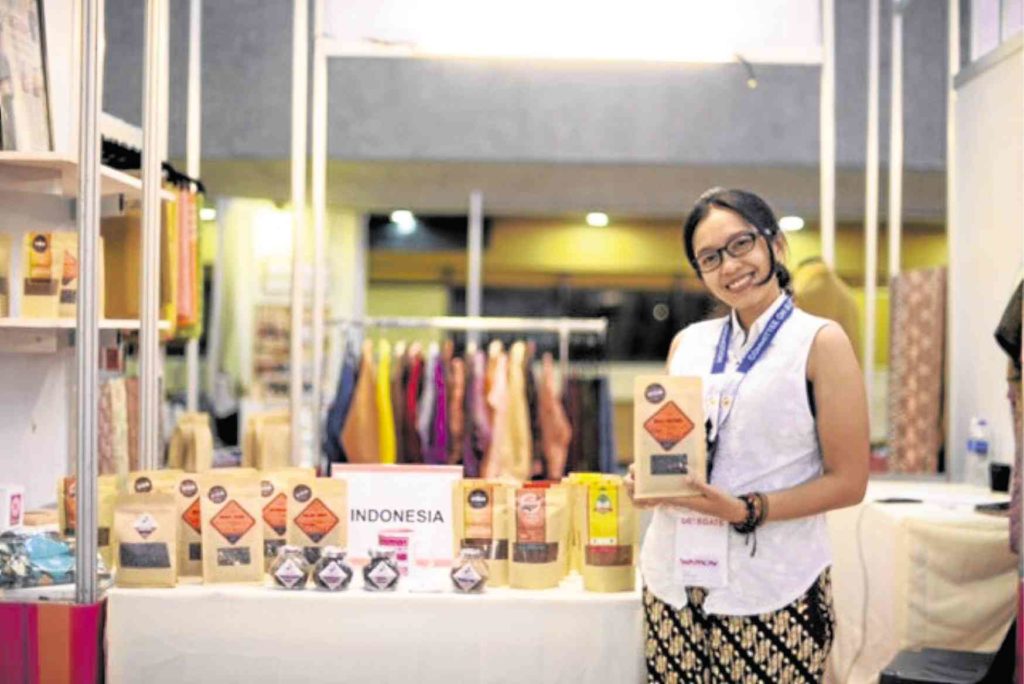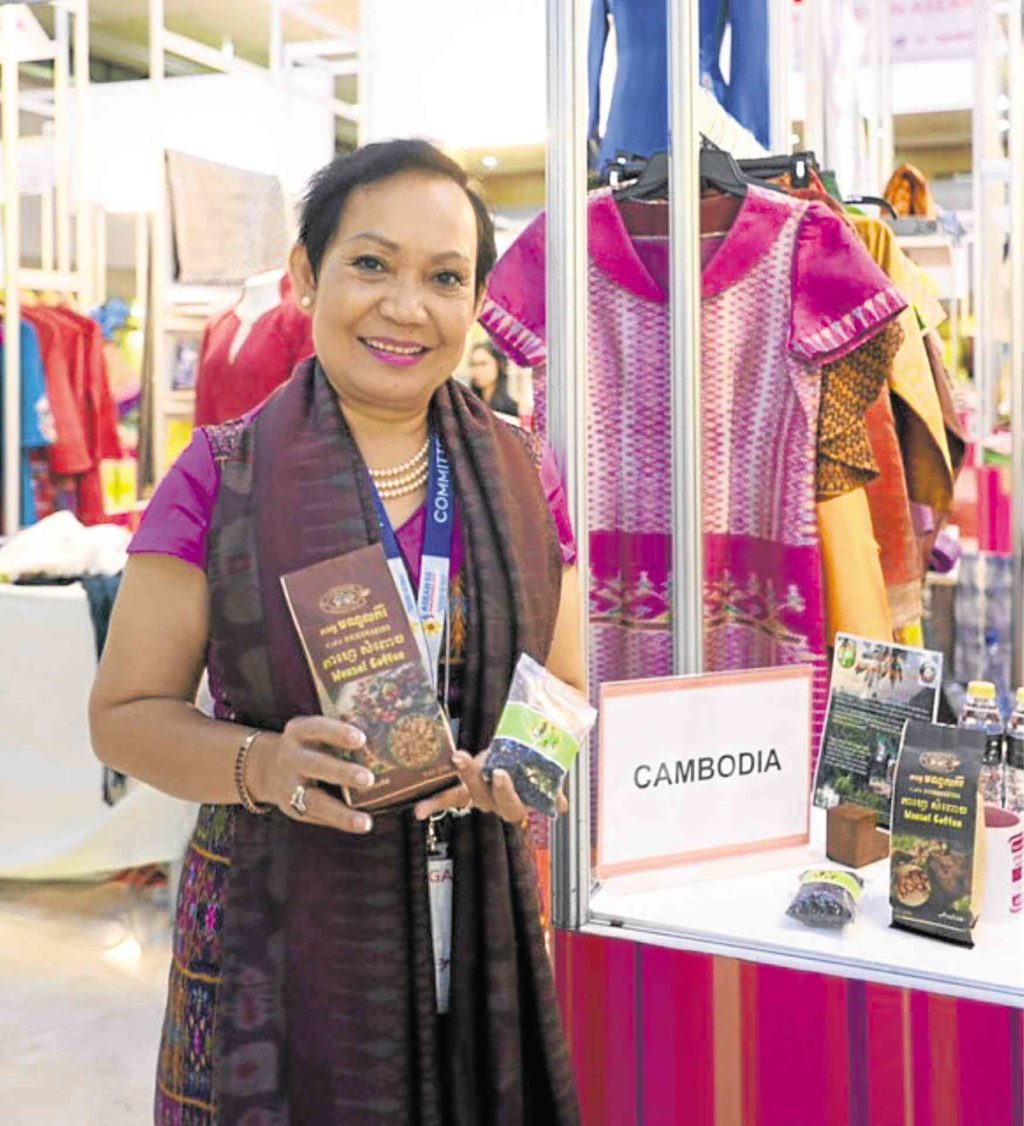Through their food, textile, jewelry and other products, the innovative and entrepreneurial spirit of women from the 10 Asean member-states filled the halls of the Philippine International Convention Center during the recently concluded Great Women in Asean Trade Showcase, which was part of the four-day Asean Women’s Business Conference.
One who proudly showcased her wares was Cambodia’s Nanda Pok, who grows the world-famous kampot pepper—described as the “perfect pepper”—in her farm in southern Kep Province.
“Kampot pepper is planted only in six districts in Cambodia. It has geographical certification, which is like special zoning reserved only for areas where you can grow pepper of certain taste and aroma,” she says. “If you look up kampot pepper, you’ll see that it’s world-famous for cooking. It brings out the best taste of food.”
Working in agriculture for the past 15 years, Pok runs The Pok’s Farm, a 65-hectare piece of land where she organically grows, aside from kampot pepper, fruit trees such as coconut, mango, durian and papaya. Kampot pepper, she says, is her favorite produce because of its international renown.
“We export a lot of pepper to Europe—France, Italy, Germany,” says Pok, who is also the co-founder of the Cambodia Women Business Federation. She was joined by other members selling accessories made from recycled magazines and silver and gold jewelry set with precious stones.
Access to Cambodia’s prized kampot pepper, which comes in black, white and red variants, has been made easier by the Philippine-led Great Women (GW) brand established by the Echosi Foundation. From a local public-private partnership program geared toward helping women micro-entrepreneurs move up the market value chain, GW has branched out to the whole Asean region.
It was a platform which Indonesian “solopreneur” (solo entrepreneur) Rinda Wulan found very helpful to her business, Kopi Kelana. It was what pushed her to pursue the venture full-time, instead of working as an architect. Wulan was one of those who joined a coffee training program here in the country led by GW last year.
The training took them to Cavite State University, which has laboratory and research facilities dedicated to coffee, which Wulan says “inspired” her.
“It was very, very great, because they are very serious in their research in coffee. In Indonesia, we have a lot of coffee plantations, but you won’t find [those kinds of facilities], not yet. We were here for four days, where we went to plantations, did roasting and cupping,” she recalls.
Asked why she became interested in the coffee business, Wulan says she is intrigued by how different geographical locations in Indonesia affect the taste of coffee.
“So I kept learning [about that], until one day I said, ‘okay, I’m going to start selling,’” she says. “I’m an architect, but [having my own business] is more relaxing for me; the pressure isn’t high, unlike in architecture. I practiced for only five or six years.”
Aside from coffee, Wulan also sells loose leaf teas and palm sugar. She sources these from local farmers and indicates on her products’ packaging the areas in Indonesia where they come from.
Her brand, Kelana, means adventure. She explains it’s as if her customers go through one when sampling her products.
“[I branched out to teas] because the farmers kept saying, ‘ma’am, I have teas, why don’t you try?’ And I did and found out that, wow, this is so nice,” Wulan says as she offered a sniff of an aromatic vanilla-flavored variant. “Then another offered palm sugar, and I said, ‘okay, I’ll try.’ I also trained [the farmers], talked to them about how to make higher quality produce, and told them that ‘the higher the quality, the higher I’ll pay you.’”
The same training Wulan underwent encouraged Pok, who was also one of the participants, to do the same: Explore Cambodia’s coffee.
“The coffee I brought [to the training], I learned, had one of the best tastes and smells, and that made me very proud. I shared my experience with other members of my federation, and I started mentoring small businesses in coffee, which is now branded as Mondulkiri Coffee,” she says.
The best lesson Pok learned, which she relayed to the coffee farmers she now works with, was to pick ripe.
“People before would just pick anything. Then I came for training in the Philippines, and I learned that picking ripe would give you the best taste and smell of coffee. So I came back and started teaching our farmers,” she says.
Working with smallholder farmers is also the advocacy of Soulinda Saysanavongphet, proprietor of Soulinda Coffee and Soulinda Souvenir & Gifts from Laos. Her GW showcase included all-natural organic banana chips, which are made by some of the country’s rice farmers who grow bananas during the lean season.
The banana chips are simply deep-fried, says Saysanavongphet. No sugar is added, and the chips come in two variants: Ripe, for those who prefer a sweeter taste; and green, for those watching their sugar levels.
Pinoys represent: Assortment of products from Echostore, Royal Coffee from Sulu, Zarah Juan’s beaded bags and shoes made by indigenous tribes, T’boli accessories by the Cooperation of Women in Health and Development, Chill by Nooks yarnwork. —Richard Reyes



